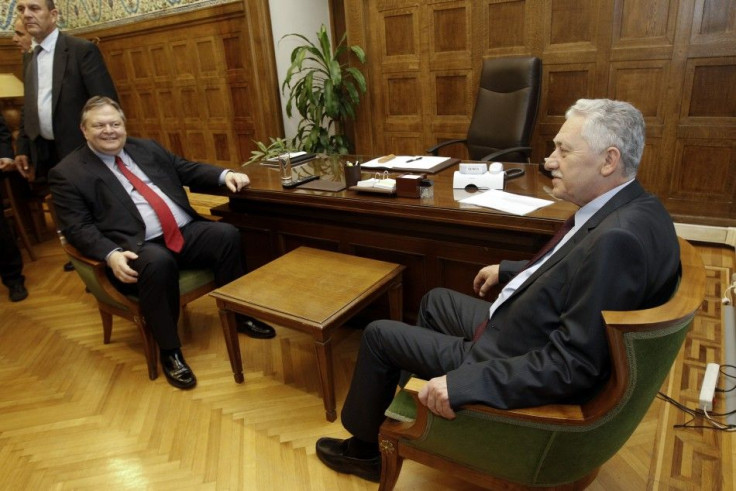Greece: PASOK Leader Sees Some Hope In Forming Coalition Government

Evangelos Venizelos, the leader of Greece’s Socialist PASOK party, said late Thursday he is making progress in forming a new unity government in the wake of fractured parliamentary elections last weekend in a country facing financial Armageddon.
Venizelos, whose party finished a humbling third in Sunday's election with only 13.7 percent of the vote, nonetheless received the mandate to form a unity government following the inability of Antonis Samaras of the conservative New Democracy and Alexis Tsipras of the leftist Syriza alliance to find a compromise solution to the political crisis.
The Greek public expressed its outrage against the mainstream political parties over draconian sending cuts that Athens imposed in exchange for huge bailout loans from the European Union and International Monetary Fund.
Now, Venizelos’ more upbeat outlook appears to have been fostered by productive talks he held with the leader of the Democratic Left, Fotis Kouvelis.
Kouvelis said he is prepared to join a coalition that would ensure Greece remains in the euro zone, while concurrently rejecting austerity measures, which include huge cuts to pensions and salary, increased taxes and thousands of lost public sector jobs.
“The moment of truth is approaching for everyone,” said Kouvelis.
“I propose the formation of an ecumenical government made up of trustworthy political figures that will reflect and respect the message from the elections.”
Kouvelis added: “This government’s mission, which will have a specific program and timeframe that will last until the European elections of 2014, will be twofold: Firstly, to keep the country in the European Union and euro and, secondly, to begin the gradual disengagement from the [EU-IMF] memorandum.”
Responding to reports that Kouvelis might become prime minister in a new coalition, he said: “I underline that we, and myself personally, are not looking for anything other than the satisfaction of having contributed to the exit from the crisis, to the benefit of the country and its people.”
Venizelos, the former finance minister, described the chat with Kouvelis as a “good omen.”
“The discussion we had with Mr. Kouvelis was very substantive,” he said.
“Mr. Kouvelis set out a specific and responsible proposal. We are very close, it is virtually in line with our suggestion for the creation of a national unity government that seeks to move beyond the memorandum within three years.”
The PASOK leader will meet with Samaras and Tsipras on Friday.
But if Venizelos cannot reach a compromise with other party bosses for a new government, President Karolos Papoulias will be compelled to call on political parties to form an emergency coalition. At a last resort, if nothing is done by May 17, new elections will have to be held.
Greece is facing other urgent issues with respect to its huge financial crises.
On Wednesday, the euro zone's rescue fund chose to withhold €1 billion of its latest tranche of bailout money for Greece, subject to a decision by euro zone finance ministers at a meeting scheduled Monday. However, the fund said it would distribute €4.2 billion euros of the €5.2 billion due to Athens on Thursday.
The European Union and Germany have repeatedly urged Greece to maintain austerity and meet its stringent financial obligations under the bailout agreements.
Germany would like to keep Greece in the euro zone, but Greece's fate is now in its own hands, warned German Foreign Minister Guido Westerwelle on Wednesday.
Indeed, if Greek political parties fail to come to some kind of compromise, the country may be unable or unwilling to abide by the terms of the two EU/IMF loans.
Of even greater urgency, Athens needs to find another €11.5 billion euros ($14.3 billion) of cuts next month, or the government may default on the bailout loans, leading to a possible exit from the euro zone.
Fears are growing that Greece will indeed exit the euro, regardless of how the political dramas in Athens play out. Bloomberg reported that more than half of investors and traders it surveyed are predicting that Greece will depart the euro sometime this year. They are also fearful that Spain, a much larger economy than Greece, may default.
A report in the Wall Street Journal warned: “Two years after Europe bailed Greece out to protect the euro, the rescue has become a debacle that threatens to unravel the common currency…. Greece's growing turmoil is the culmination of a radical austerity experiment and botched economic overhaul that have pushed the nation to the brink ... The story of the ill-fated bailout suggests that forcing deep austerity on individual member states won't save the euro and may worsen its crisis.”
© Copyright IBTimes 2025. All rights reserved.





















